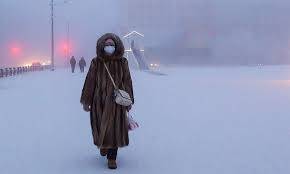The Top 5 Coldest Countries in the World
When it comes to extreme cold, there are certain places on Earth where temperatures plunge to jaw-dropping lows. The following five countries consistently experience some of the coldest weather on the planet, and their residents are no strangers to harsh winters. Here’s a look at the five coldest countries in the world.
1. Antarctica
While technically not a country, Antarctica is the coldest place on Earth and deserves mention as the ultimate frozen expanse. This icy continent, governed by an international treaty, is home to scientific research stations rather than permanent settlements. Temperatures in Antarctica can plummet as low as -128.6°F (-89.2°C) at the Soviet Union’s Vostok Station in 1983, which remains the record for the coldest temperature ever recorded on Earth. The continent is covered by an ice sheet that accounts for around 60% of the world’s fresh water. Its harsh conditions make it nearly impossible for human life to thrive, with winter temperatures regularly dipping below -70°F (-56°C) in many regions.
2. Russia
Russia is vast, and its frigid Siberian region holds some of the coldest inhabited places on Earth. The village of Oymyakon, located in Siberia, is often considered the coldest inhabited place on Earth, with temperatures reaching -67.7°F (-55.4°C). The Russian Far East, including regions like Yakutia, experiences bone-chilling winters with average temperatures that often hover well below freezing for months. While its capital, Moscow, enjoys milder winters compared to Siberia, Russia's northernmost territories can reach temperatures as low as -40°F (-40°C). Russia’s cold weather is exacerbated by its immense size, with much of its landmass being located in high latitudes.
3. Canada
Canada is another country where extreme cold is a regular part of life, especially in the northern and central regions. The northern territories, such as Yukon and the Northwest Territories, experience frigid winters, with temperatures often dipping below -40°F (-40°C). The small town of Snag, located in the Yukon, holds the record for Canada’s lowest temperature ever recorded at -81.4°F (-63°C). The cold is particularly pronounced in areas further from the ocean, which lack the moderating effect of sea temperatures. Even major cities like Winnipeg and Edmonton are notorious for their bone-chilling winters, though they are more equipped to handle the cold with advanced infrastructure.
4. Greenland (Denmark)
Though politically a part of Denmark, Greenland is an autonomous region with some of the coldest weather in the world. The majority of Greenland's landmass is covered by an ice sheet, and its coastal areas experience extremely cold winters with temperatures averaging below -40°F (-40°C) during the coldest months. The capital city, Nuuk, sees winter temperatures hovering around -20°F (-29°C). Greenland’s high latitude, coupled with its vast ice-covered terrain, contributes to the region’s prolonged cold seasons and icy conditions. In addition to its freezing winters, Greenland is subject to long polar nights and the occasional appearance of the Northern Lights.
5. Finland
Finland is known for its stunning winter landscapes, which are a magnet for tourists seeking the Northern Lights, ice fishing, and snow sports. The northern regions, particularly Lapland, experience some of the coldest temperatures in Europe. In places like Rovaniemi, temperatures can regularly fall below -40°F (-40°C) during the peak of winter. Finland's cold weather is influenced by its proximity to the Arctic Circle, which results in long, harsh winters with little daylight. Despite the cold, Finland has adapted, with efficient heating systems and a culture of embracing winter sports and outdoor activities.
Conclusion
These five regions—Antarctica, Russia, Canada, Greenland, and Finland—are home to some of the most extreme and frigid climates on Earth. Living in such cold conditions requires resilience, preparation, and a strong understanding of how to cope with the harshest elements nature can offer. From Antarctica's vast ice sheets to Siberia’s frozen villages, these cold countries embody the planet’s most extreme environments.


